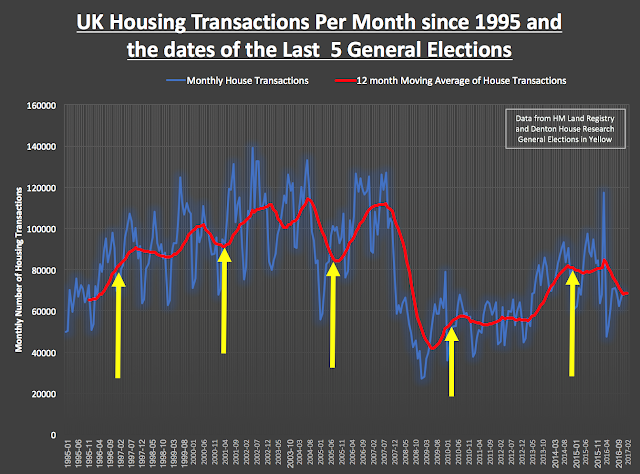Many
homeowners have made contact asking what the General Election will do to the Falmouth
property market? The best way to tell
the future is to look at the past.
Therefore, I
wanted to compare what happened in 1997, 2001 and 2005 when Tony Blair was almost
guaranteed to be elected/re-elected against the last more close-run elections of
2010 and 2015 ... in terms of the number of houses sold and the prices achieved.
Look at the first graph below comparing
the number of properties sold and the dates of the general elections
It is clear, looking at the number
of monthly transactions (the blue line), that there is a certain rhythm or
seasonality to the housing market. That rhythm/seasonality has not changed
since 1995 (seasonality meaning the periodic
fluctuations that occur regularly based on a season) For instance you can see how the number of properties sold dips around
Christmas, rises in Spring and Summer and drops again at the end of the year.
To remove that seasonality, I
have introduced the red line. The red line is a 12 month ‘moving average’ trend
line which enables us to look at the ‘de-seasonalised’ housing transaction
numbers.
The yellow arrows denote the times of the general elections.
The yellow arrows denote the times of the general elections.
It is clear to see that after the
1997, 2001 and 2005 elections, there was significant uplift in the number of
households sold, whilst in 2010 and 2015, there was slight drop in house
transactions (i.e. number of properties
sold).
In plain English, it seems to
follow that a landslide or clear election result, tends to translate to a more
confident market and one where properties sell quicker and in greater volume.
Anything less than a clear victory appears to result in a less confident
post-election sales environment.
Next, I wanted to consider what
happened to property prices. In the graph below, I have used that same 12-month
average, housing transactions numbers (in red) and yellow arrows for the dates
of the general elections but this time compared that to what happened to
property values (pink line).
There is no discernible pattern of increasing house prices in the 12 months following an election. In 1997 and 2001 they did. In 2005 they plateaued. In 2010 they fell away. In 2017 they raced away. The wider economics are more at play perhaps than the politics.
What one can read into both graphs is that while an election might help you sell (more transactions taking place), it does not necessarily mean you will sell for more.
So finally, what does this mean for the landlords of the 2,054 private rented properties in Falmouth?
What one can read into both graphs is that while an election might help you sell (more transactions taking place), it does not necessarily mean you will sell for more.
So finally, what does this mean for the landlords of the 2,054 private rented properties in Falmouth?
Well, as I have discussed in previous
articles (and just as relevant for homeowners as well) property value growth in
Falmouth will be a little more subdued in the next few years for reasons other
than the general election.
The growth
of rents has taken a very slight hit in the last few months as there has been a
slight over supply of some types of rental property in Falmouth. Much of this is due to the
seasonal nature of the rental market in Falmouth particularly between November
and the beginning of March. During those times Falmouth landlords need to be realistic
with their market rents. Once the winter
let season finishes and holidaymakers arrive for Easter those displaced tenants
fuel the demand and upward rental cycle until the reverse happens at the end of
the season. Twas ever thus here in this part of Cornwall
In the long term, as the younger
generation still choose to rent rather than buy ... the prospects, even with
the changes in taxation, mean investing in buy-to-let still looks a good bet. Look at the pink line since 1995. At the risk of sounding like a broken record.. where
else are you going to place your money – stock, shares, savings accounts or
bricks and mortar? Naturally you can gauge our response to that as Landlords
ourselves!




